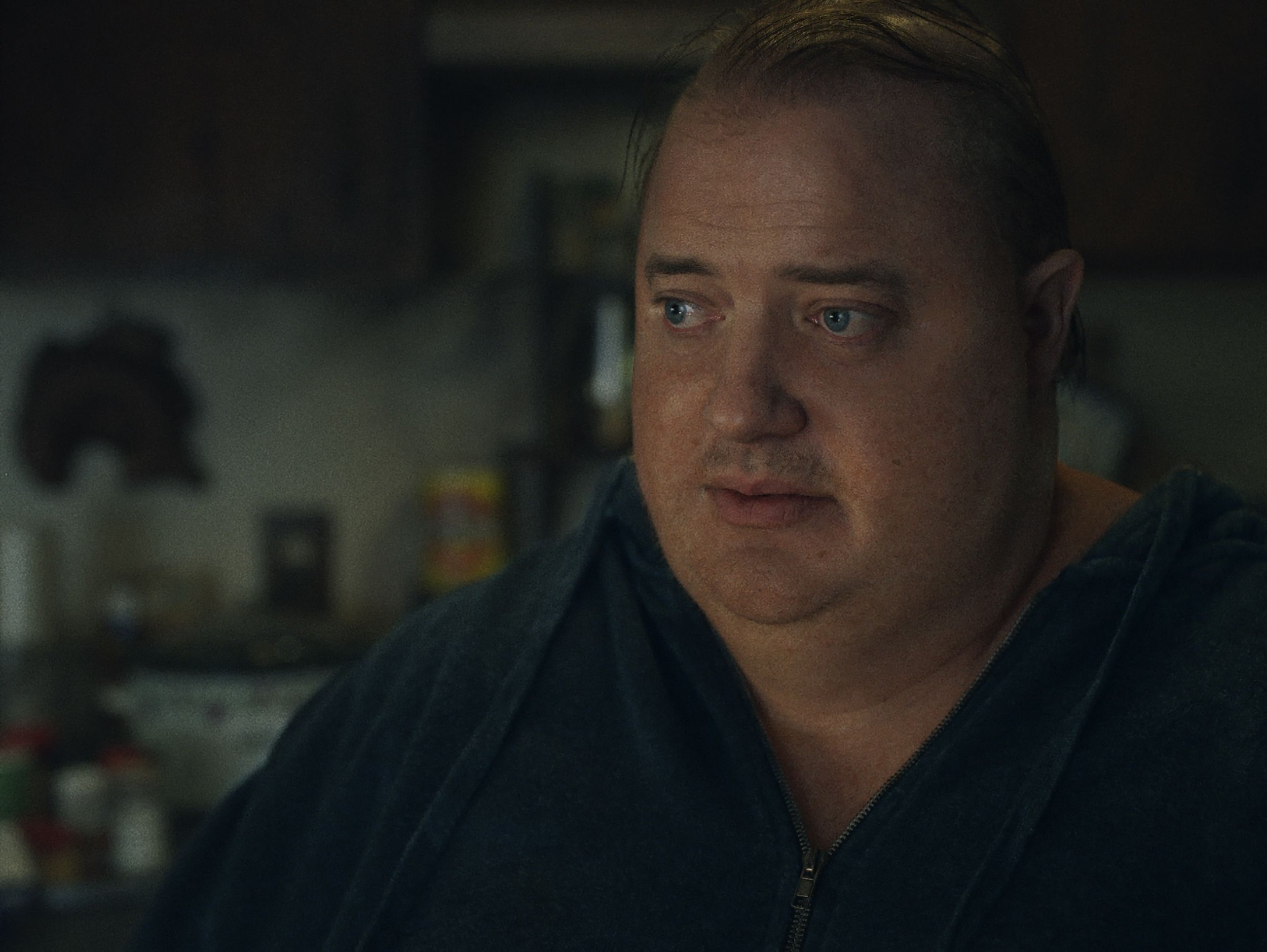The Whale: Size Matters, But Tragedy Trumps All in Brendan Fraser's Depiction of a Private Hell
By Jim Slotek
Rating: B-minus
However serious its intent, there is also serious baggage that comes with a project like The Whale – maybe more than director Darren Aronofsky anticipated.
Before the fact, an angry outside world already has had much to say about a movie whose lead wears a “fat-suit,” and how we should feel about a portrayal of a traumatized 600-pound man – played here by Brendan Fraser - committing suicide via food.
The “why” is interesting. If the instrument of death were alcohol or drugs, The Whale could be Leaving Las Vegas or Barfly. Cue the applause.
Brendan Fraser as Charlie, the recluse committing suicide by food in The Whale.
But society is not even-handed about our vices. Alcohol, for all the damage it can inflict, is advertised as glamourous. Overindulgence in food, which we need to live, arguably carries more stigma. “Fat kids” will always be fat kids in their heads, even if they aren’t anymore (trust me on this).
So, I get why The Whale – taken from the play by Samuel D. Hunter - is so contentious. Sometimes it seems that the only thing keeping the torch-carrying villagers at bay is the general consensus, even among the film’s detractors, that Fraser’s humanity in the role shines through.
It’s the audience’s right to decide whether this story of death-by-comfort-food is an insult to people-of-size everywhere. I vote no. This is not Shallow Hal or Fat Bastard. It’s tragedy, not cruel comedy.
We’re introduced to the aftermath of the character’s damage before we piece together the damage itself, the suicide of his former partner. Charlie (Fraser) is a creative writing teacher at a local college, who conveniently uses Zoom to conduct his classes in the apartment in which he is all but trapped.
He maintains that his camera lens is broken, thus hiding himself from sight. For the same reason, he insists his pizza delivery man Dan (Sathya Sridharan) leave his pie on the porch.
In a jarring introduction, Charlie suffers a heart attack while masturbating to gay porn. His near-death experience connects us to his best friend Liz (Hong Chau), a doctor whose commitment to this nightmare patient is a mystery for a while, and to a young, cheerily aggressive Christian missionary (Ty Simpkins), who seems to see Charlie as an opportunity to save a soul while there’s still time.
And then there’s Ellie, Charlie’s all-but-estranged daughter (Sadie Sink), and author of a trenchant childhood review of Melville’s Moby Dick, which Charlie deems brilliant and has always kept in his possession for years. Hence, the title.
The attempt to reconcile their difficult relationship is the redemptive framework for the movie. Meanwhile, every person still attached to Charlie’s dwindling existence is either profoundly frustrated with him (as the audience has a right to be) or ultimately horrified when he reveals himself like Quasimodo.
There have been “takes” on the movie that suggest Aronofsky is himself repulsed by the character he has created. Yet the fact that Charlie goes to lengths to hide, suggests that this repulsion is societal and that he knows it all too well.
But like Charlie himself, Aronofsky overindulges. Never a subtle filmmaker (Black Swan, Mother!) his depiction of his movie’s protagonist sometimes crosses over into competitive-eating volume, each new emotional wound inspiring the pounding back of KFC and meatball sandwiches to the point of regurgitation.
Despite what redemption there ultimately is, The Whale is a feel-bad movie. But in a movie marketplace saturated with homogeneity, at least it inspires you to feel something.
The Whale. Directed by Darren Aronofsky. Starring Brendan Fraser, Sadie Sink and Hong Chau. Opens in theatres Friday, December 23.



